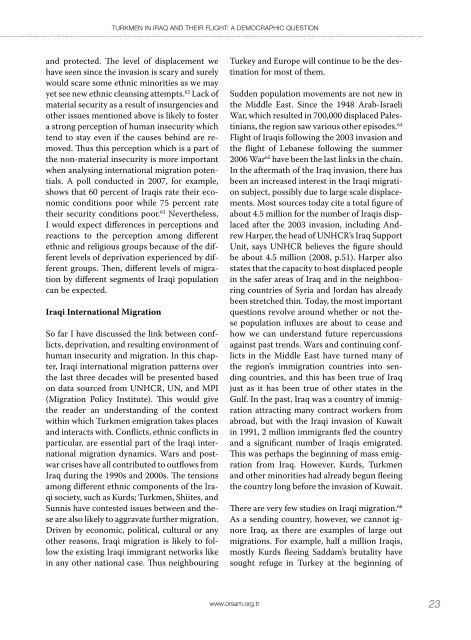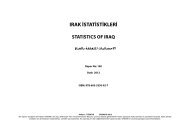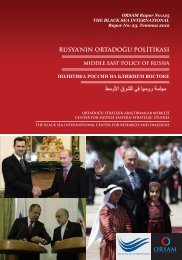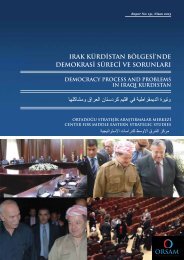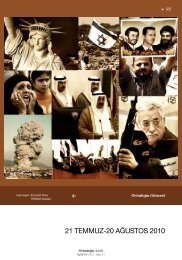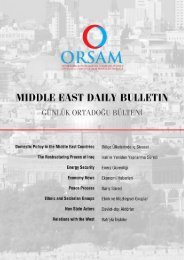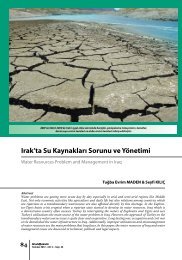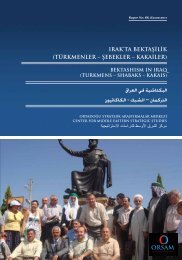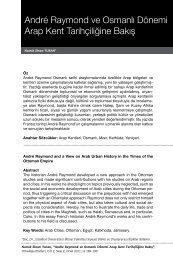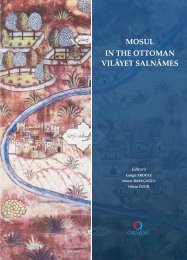turkmen in iraq and their flight - orsam
turkmen in iraq and their flight - orsam
turkmen in iraq and their flight - orsam
Create successful ePaper yourself
Turn your PDF publications into a flip-book with our unique Google optimized e-Paper software.
TURKMEN IN IRAQ AND THEIR FLIGHT: A DEMOCRAPHIC QUESTION<br />
<strong>and</strong> protected. The level of displacement we<br />
have seen s<strong>in</strong>ce the <strong>in</strong>vasion is scary <strong>and</strong> surely<br />
would scare some ethnic m<strong>in</strong>orities as we may<br />
yet see new ethnic cleans<strong>in</strong>g attempts. 62 Lack of<br />
material security as a result of <strong>in</strong>surgencies <strong>and</strong><br />
other issues mentioned above is likely to foster<br />
a strong perception of human <strong>in</strong>security which<br />
tend to stay even if the causes beh<strong>in</strong>d are removed.<br />
Thus this perception which is a part of<br />
the non-material <strong>in</strong>security is more important<br />
when analys<strong>in</strong>g <strong>in</strong>ternational migration potentials.<br />
A poll conducted <strong>in</strong> 2007, for example,<br />
shows that 60 percent of Iraqis rate <strong>their</strong> economic<br />
conditions poor while 75 percent rate<br />
<strong>their</strong> security conditions poor. 63 Nevertheless,<br />
I would expect differences <strong>in</strong> perceptions <strong>and</strong><br />
reactions to the perception among different<br />
ethnic <strong>and</strong> religious groups because of the different<br />
levels of deprivation experienced by different<br />
groups. Then, different levels of migration<br />
by different segments of Iraqi population<br />
can be expected.<br />
Iraqi International Migration<br />
So far I have discussed the l<strong>in</strong>k between conflicts,<br />
deprivation, <strong>and</strong> result<strong>in</strong>g environment of<br />
human <strong>in</strong>security <strong>and</strong> migration. In this chapter,<br />
Iraqi <strong>in</strong>ternational migration patterns over<br />
the last three decades will be presented based<br />
on data sourced from UNHCR, UN, <strong>and</strong> MPI<br />
(Migration Policy Institute). This would give<br />
the reader an underst<strong>and</strong><strong>in</strong>g of the context<br />
with<strong>in</strong> which Turkmen emigration takes places<br />
<strong>and</strong> <strong>in</strong>teracts with. Conflicts, ethnic conflicts <strong>in</strong><br />
particular, are essential part of the Iraqi <strong>in</strong>ternational<br />
migration dynamics. Wars <strong>and</strong> postwar<br />
crises have all contributed to outflows from<br />
Iraq dur<strong>in</strong>g the 1990s <strong>and</strong> 2000s. The tensions<br />
among different ethnic components of the Iraqi<br />
society, such as Kurds; Turkmen, Shiites, <strong>and</strong><br />
Sunnis have contested issues between <strong>and</strong> these<br />
are also likely to aggravate further migration.<br />
Driven by economic, political, cultural or any<br />
other reasons, Iraqi migration is likely to follow<br />
the exist<strong>in</strong>g Iraqi immigrant networks like<br />
<strong>in</strong> any other national case. Thus neighbour<strong>in</strong>g<br />
Turkey <strong>and</strong> Europe will cont<strong>in</strong>ue to be the dest<strong>in</strong>ation<br />
for most of them.<br />
Sudden population movements are not new <strong>in</strong><br />
the Middle East. S<strong>in</strong>ce the 1948 Arab-Israeli<br />
War, which resulted <strong>in</strong> 700,000 displaced Palest<strong>in</strong>ians,<br />
the region saw various other episodes. 64<br />
Flight of Iraqis follow<strong>in</strong>g the 2003 <strong>in</strong>vasion <strong>and</strong><br />
the <strong>flight</strong> of Lebanese follow<strong>in</strong>g the summer<br />
2006 War 65 have been the last l<strong>in</strong>ks <strong>in</strong> the cha<strong>in</strong>.<br />
In the aftermath of the Iraq <strong>in</strong>vasion, there has<br />
been an <strong>in</strong>creased <strong>in</strong>terest <strong>in</strong> the Iraqi migration<br />
subject, possibly due to large scale displacements.<br />
Most sources today cite a total figure of<br />
about 4.5 million for the number of Iraqis displaced<br />
after the 2003 <strong>in</strong>vasion, <strong>in</strong>clud<strong>in</strong>g Andrew<br />
Harper, the head of UNHCR’s Iraq Support<br />
Unit, says UNHCR believes the figure should<br />
be about 4.5 million (2008, p.51). Harper also<br />
states that the capacity to host displaced people<br />
<strong>in</strong> the safer areas of Iraq <strong>and</strong> <strong>in</strong> the neighbour<strong>in</strong>g<br />
countries of Syria <strong>and</strong> Jordan has already<br />
been stretched th<strong>in</strong>. Today, the most important<br />
questions revolve around whether or not these<br />
population <strong>in</strong>fluxes are about to cease <strong>and</strong><br />
how we can underst<strong>and</strong> future repercussions<br />
aga<strong>in</strong>st past trends. Wars <strong>and</strong> cont<strong>in</strong>u<strong>in</strong>g conflicts<br />
<strong>in</strong> the Middle East have turned many of<br />
the region’s immigration countries <strong>in</strong>to send<strong>in</strong>g<br />
countries, <strong>and</strong> this has been true of Iraq<br />
just as it has been true of other states <strong>in</strong> the<br />
Gulf. In the past, Iraq was a country of immigration<br />
attract<strong>in</strong>g many contract workers from<br />
abroad, but with the Iraqi <strong>in</strong>vasion of Kuwait<br />
<strong>in</strong> 1991, 2 million immigrants fled the country<br />
<strong>and</strong> a significant number of Iraqis emigrated.<br />
This was perhaps the beg<strong>in</strong>n<strong>in</strong>g of mass emigration<br />
from Iraq. However, Kurds, Turkmen<br />
<strong>and</strong> other m<strong>in</strong>orities had already begun flee<strong>in</strong>g<br />
the country long before the <strong>in</strong>vasion of Kuwait.<br />
There are very few studies on Iraqi migration. 66<br />
As a send<strong>in</strong>g country, however, we cannot ignore<br />
Iraq, as there are examples of large out<br />
migrations. For example, half a million Iraqis,<br />
mostly Kurds flee<strong>in</strong>g Saddam’s brutality have<br />
sought refuge <strong>in</strong> Turkey at the beg<strong>in</strong>n<strong>in</strong>g of<br />
www.<strong>orsam</strong>.org.tr<br />
23


